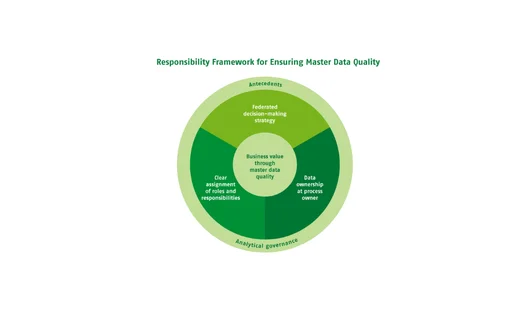Van der Knaap recently graduated from Tilburg University and works as a data & analytics consultant at Centric. Why did he choose data governance for his thesis research? "During my master's in Information Management, I learned that data governance is mainly about the human aspect of improving data. You can buy tools to improve data quality, but ultimately people have to use those tools. I find that focus on the human aspect interesting." He delved into data governance and discovered that there was not yet a framework for master data governance. "I doubted what I could contribute to this research field as a student. When I found out that no framework existed yet, I thought it was a great opportunity to add something! That way I could combine both the human and data aspects."
What is master data?
In his graduate research, Van der Knaap developed a framework for master data governance. "Master data are important data that are widely used in the organization. For local government, for example, it is the name and address details of residents." It is important that every department, process and system uses identical master data, such as the same resident address. Data not covered by master data are transactional data, for example, such as process lead times or receipts. In short, then, master data provides a shared reference point for an organization's core objects. For example, suppliers, products or employees.
Key insights
In his research, Van der Knaap looked at best practices in data governance and master data. Combining these, he arrived at a number of hypotheses of what is the most appropriate approach for master data governance. In interviews with seven experts from different organizations, including four from the public sector, he tested these hypotheses. It provided him with a number of insights. "I thought that many organizations were already quite advanced with data governance, given all the literature on the subject. But they're not. That also means that the main focus now is on data quality in a broad sense, not just master data." Van der Knaap broadened the governance framework he developed with the experts so that it can be used not only for master data, but for promoting data quality in general. Another striking insight gained by Van der Knaap is that organizations are making clear choices when it comes to data quality. "Value creation comes first, the main focus is on how to get as much value as possible out of data. Investments in data quality are made from that point of view. Obvious perhaps, but not so in science. There the focus is on data quality in general and no distinction is made between data."





